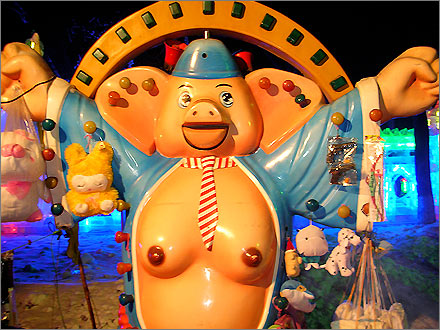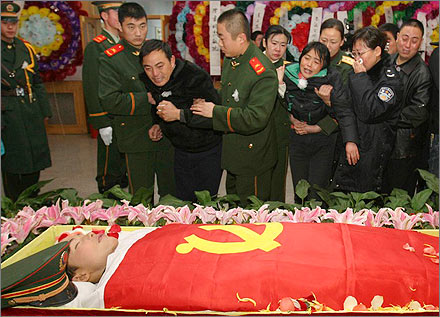« December 2006 | HOME PAGE | February 2007 »
January 31, 2007
American Citizen Services
 A notice from your friends at the U.S. Embassy:
A notice from your friends at the U.S. Embassy:
A vice consul from the U.S. Embassy will be available in Urumqi on Sunday, February 4th from 7:00pm-8:00pm Beijing Time in the lobby of the Hongfu Hotel (新疆鸿福大饭店). The address of the Hongfu Hotel is No.26 Huanghe Road, Urumqi (乌鲁木齐市黄河路26号) and phone number is 0991-588-1891.
The vice consul will also be available in Kashgar on Wednesday, February 7th from 8:00p.m.-9:00pm Beijing Time in the lobby of the Taxinan Barony Hotel (塔西南邦陈饭店). The address of the Taxinan Barony Hotel is No.242 Seman Road (喀什市色满路242号)and the phone number is 0998-258-6888.
The vice consul will be available to assist American citizens by performing notarial services, adding passport pages, and providing registration information. Passport applications will also be available, and the vice consul will answer any other questions related to Embassy services.
If you wish to have additional pages added to your passport you must email us the following information: (1) name (as it appears in the passport); (2) date of birth; (3) gender; (4) place of birth; (5) social security number; (6) permanent address; (7) home and/or business telephone; (8) passport number; (9) passport issuance and expiration date and its place of issuance by open of business on Friday, February 2. If you wish to have a notarial serve performed, please email your name, date and place of birth by open of business on Friday, February 2. Our e-mail address is amcitbeijing@state.gov.
Please ask the hotel reception desk if you cannot locate the outreach program. We apologize for the short notice, but look forward to seeing you there.
American Citizen Services
U.S. Embassy, Beijing
Tel: 0086-10-65323431
Fax: 0086-10-65324153
posted January 31, 2007 at 12:59 AM unofficial Xinjiang time | Comments (24)
January 30, 2007
In the Shadow of Development

With little hope of generating enough profits to match a price tag of $3.7 billion, the rail line to Tibet that opened this past summer has generated a lot of scepticism about the motives of the Chinese government. Many have worried about the influx of tourist hordes into a once-remote area. Some have worried about the military implications. Others have worried about the impact on the environment (from Xinhua):
There are 60.9 million hectares of national nature reserve on the Qinghai-Tibet Plateau through which the 1,142-kilometer railway runs, but Huang Difu, chief commander of the Qinghai-Tibet Construction Headquarters, revealed how environmental protection was made an expensive priority.
"We have spent 1.54 billion yuan (192.5 million U.S. dollars) on protecting rare species and the vulnerable environment," he said....
Flocks of Tibetan antelopes can move leisurely across a bridge under the railway. "Tibetan antelopes are our bosses, whom we could never provoke," a railway construction worker joked.
And the loser is... the environment! Congratulations to all of you whom - albeit without a great deal of scientific conviction - just somehow knew that this railway was going to ruin the pristine environment on the Tibet-Qinghai plateau (from Mineweb):
Critics had long questioned Chinas claim that the development of Tibet was the sole reason behind the building of the 1,956-km Qinghai-Tibet Railway. Now, the official Chinese news agency Xinhua has reported that Meng Xiani, director of the China Geological Survey (CGS), has revealed that 16 large copper, lead, zinc, iron iron and crude oil deposits along the railway are expected to yield 18 million tons of copper, and 10 million tons of lead and zinc.
One copper deposit on Qulong has a proven reserve of 7.89 million tons, second only to the countrys largest copper mine in Dexing in Chinas Jiangxi Province. The CGS believes the copper reserves in Quolong could reach 18 million tons, making it the largest copper deposit in the country.
Zhang said three major copper deposits in Qulong and in Yunan Provinces Pulang and Yangla regions, will add 26.78 million tons of copper to Chinas reserves, increase total mined copper output by almost a third, and reduce Chinas dependence on copper imports. Chinas copper miners currently produce about 600,000 tons of copper annually. The nation imported another 731,200 tons of refined copper from January to November last year, more than a quarter of its domestic output.
Chinese steel mills are extremely dependent on imported iron ore. The Chinese Geological Survey announced it has found estimated reserves of 760 million tons of high-grade iron ore along the rail line in the Kunglun Mountain on the western Qinghai-Tibet plateau and the southern Xinjiang Province, according to Deputy Director Zhang Hongtao.
Who will be able to forget the first time they visit a toxic open-pit mine where endangered Tibetan antelope once roamed? Ah, sweet sweet memories. You can read the full articles below.
Mineweb: Massive metals deposits revealed along China's Qinghai-Tibet Railway
29 January 2007
Mineweb
(Mineweb.com) --Chinese geologists have disclosed one of the closely-held secrets that motivated the nation to spend US$3.7 billion on the Tibet railway: the discovery of large mineral deposits that may reduce the nations dependence on mineral imports.
Critics had long questioned Chinas claim that the development of Tibet was the sole reason behind the building of the 1,956-km Qinghai-Tibet Railway. Now, the official Chinese news agency Xinhua has reported that Meng Xiani, director of the China Geological Survey (CGS), has revealed that 16 large copper, lead, zinc, iron iron and crude oil deposits along the railway are expected to yield 18 million tons of copper, and 10 million tons of lead and zinc.
One copper deposit on Qulong has a proven reserve of 7.89 million tons, second only to the countrys largest copper mine in Dexing in Chinas Jiangxi Province. The CGS believes the copper reserves in Quolong could reach 18 million tons, making it the largest copper deposit in the country.
Zhang said three major copper deposits in Qulong and in Yunan Provinces Pulang and Yangla regions, will add 26.78 million tons of copper to Chinas reserves, increase total mined copper output by almost a third, and reduce Chinas dependence on copper imports. Chinas copper miners currently produce about 600,000 tons of copper annually. The nation imported another 731,200 tons of refined copper from January to November last year, more than a quarter of its domestic output.
Chinese steel mills are extremely dependent on imported iron ore. The Chinese Geological Survey announced it has found estimated reserves of 760 million tons of high-grade iron ore along the rail line in the Kunglun Mountain on the western Qinghai-Tibet plateau and the southern Xinjiang Province, according to Deputy Director Zhang Hongtao.
Zhang also noted that the Midwestern part of the northern Qiangtang Basin in northern Tibet has favorable conditions and promising resources for oil and gas, according to the Beijing office of the Press Trust of India.
Meanwhile, the official Chinese Government news service Xinhau reported that the China Iron and Steel Association has vowed to cut the number of domestic companies importing iron ore to 90 this year. All outdated steel mills will be closed by the end of the year. The worlds top iron ore consumer, China imported 326 million tons of iron ore in 2006.
At a recent steel and iron ore industry meeting in Kuming City, it was disclosed that 20% of the nations iron-ore importers are expected to be out of business at the end of this year.
Meng said it Chinas economic security would ultimately be endangered if the nation continued to rely on imports of major mineral resources in the long term. He added that the results of the geological survey along the railroad proved it was possible to improve Chinas natural resources security.
Mineweb always carries details of at least 20 independently written top mining, mining finance, metals and mining sector analysis articles on its homepage as well as a fast news feed to keep you right up to date with what is going on in the mining and metals sectors worldwide. These are continuously updated through the day.
Qinghai-Tibet railway: environment comes before construction
15 June 2006
Xinhua News Agency
LHASA, June 15 (Xinhua) -- China is counting down to the opening of the Qinghai-Tibet railway to tourists on July 1, but there are still lingering doubts as to how the engineering feat will affect the region's eco-system.
There are 60.9 million hectares of national nature reserve on the Qinghai-Tibet Plateau through which the 1,142-kilometer railway runs, but Huang Difu, chief commander of the Qinghai-Tibet Construction Headquarters, revealed how environmental protection was made an expensive priority.
"We have spent 1.54 billion yuan (192.5 million U.S. dollars) on protecting rare species and the vulnerable environment," he said.
"To help restoration of the ecosystem, grass was transplanted so it flanks over 300 kilometers of the railway at an altitude of 4300 to 4500 meters," said Sun Yongfu, vice-minister of railways.
Meanwhile, marshland was preserved by relocating grass from low-lying land that was dug out to make way for the railway. The grass was replanted in some artificial depressions made in areas which lacked grass.
Flocks of Tibetan antelopes can move leisurely across a bridge under the railway. "Tibetan antelopes are our bosses, whom we could never provoke," a railway construction worker joked.
To ensure the regular migration of this wild animal, the government built 33 pathways in the forms of bridge and tunnel, according to Huang Difu. The Tibetan antelope is one of the most endangered species in China with only 50,000 at present.
"In the construction of the Qinghai-Tibet railway, we have put environment protection ahead of the project," said La Youyu, deputy commander. La noted that before the project was started, they had conducted comprehensive survey on climate, environment, species and eco-system of the plateau. Their goal was that no water polluted, no earth eroded, no vegetation wrecked, no animal migration hindered, and no scenery ruined.
Evaluation of environment protection units from Tibet and Qinghai in west China confirms that the goal was achieved.
posted January 30, 2007 at 10:06 PM unofficial Xinjiang time | Comments (24)
Xinjiang Blog Battle

Remember the days when I was the unopposed king of the Xinjiang blogosphere? Well, those days are over. In just the past few weeks, invaders on my turf have increased the size of the local blog universe by 200%!
Most of you already know about Who Let the Camels Loose?, where Fausto keeps us rocking to the exotic beat of Xinjiang. Nevermind that he's only written two entries... one of them is pure gold!
But how many of you have visited Xinjiang Watch? If you ever wanted to know everything that goes on in Xinjiang (literally), this is the place for you. A sample of recent news items translated from Chinese sources:
• Microsoft Office 2007 to appear in a Uyghur-Qazaq-Chinese-Qirghiz-English version!
• Last year, the workplace accident mortality rate in Qaramay fell 11%, with only 95 workers killed!
• The Ürümchi Ministry of Public Security has decided to hunt down and kill stray and rabid dogs all over the city!
• Crop levels in Xinjiang have stayed relatively stable this year, despite some structural configuration!
And so on and so forth. Exciting stuff, eh? Seriously though, they've got two good people writing already and are looking for more Xinjiang-related content. If you haven't read about it on Xinjiang Watch, it didn't happen in Xinjiang. Period!
Welcome to the newcomers... I'd better stay on my toes.
posted January 30, 2007 at 07:53 PM unofficial Xinjiang time | Comments (30)
January 25, 2007
Shineway Today. Shineway Tomorrow. Shineway Forever!
Speaking of the munchies...

I'm proud to announce The Opposite End of China's first unofficial product endorsement. Congratulations, Shineway! (Send me an email to find out where the buckets of cash should be delivered.) I may need to revise the advertising slogan in the ad above... perhaps something without the words meat and tube in close proximity. Anyway, don't let it be said the I've never done anything for anyone (or any huge corporations).
That sausage-munching (har har... I couldn't resist!) fellow on the left, by the way, happens to be my friend David Feinberg, who is currently a postdoctoral researcher in psychology at Harvard. So I feel comfortable adding this endorsement: Harvard University researchers enjoy Shineway meat sticks more than any other Chinese meat stick in the world!
Seriously, does anyone over at Shineway (双汇) want to make an offer for the two of us to travel around China promoting your meat products? We're actually pretty fond of the chicken sausage... it does a bowl of instant noodles a world of good.
posted January 25, 2007 at 04:20 PM unofficial Xinjiang time | Comments (25)
The Jammin' Shaman of Turpan
 OK, so that almost rhymes. Give me extra credit for trying.
OK, so that almost rhymes. Give me extra credit for trying.
Hat tip to The Peking Duck for alerting me to a story that slipped by unnoticed while I was traveling recently. To make a short story shorter, scientists have announced the discovery of a shaman mummy near Turpan who's burial objects included a large "sack of marijuana". The other day, Xinhua featured an update on the story (in Chinese), with emphasis on said "sack of marijuana":
Turpan Research Institute post-doctoral researcher Jiang Hong'en said: "When unearthed in 2003, the marijuana was still green as if it had just been picked. The leaves, seeds, branches, and internal plant structures were all preserved perfectly. Compared with past discoveries in China and around the world, the level of preservation here is unprecedented."
Dr. Jiang Hong'en confirmed that researchers from the Kunming Institute of Botany were recently able to extract cannabinoid substances from the 2500-year old marijuana plants.
I'm not 100% sure about the translation of that second paragraph... anyone out there know the true meaning of 大麻酚? I'm sure it's not "cannabis hydroxybenzene". How about tetrahydrocannabinol?
I've translated the article below (the original Chinese is also included) - albeit imperfectly - with the help of the lovely Ms. Fan.
Jah! We be jammin'... right by da Taklamakan, mon!
2500 Year old Marijuana Unearthed in Turpan Cemetery
Xinhuanet
January 23, 2007
URUMQI: Chinese archeologists recently announced that what is thought to be a shaman’s grave unearthed in Turpan, Xinjiang has been found to contain the world's oldest and most well-preserved specimens of marijuana.
In March 2003, archaeologists from the Turpan Cultural Relics Bureau and the Xinjiang Archaeological Research Institute excavated “Tomb No. 90” in “Area No. 1” and found a leather basket containing marijuana plants, branches and seeds. They also found a large wooden funerary basin in seriously damaged condition containing similar plant matter.
Turpan Research Institute post-doctoral researcher Jiang Hong'en said: "When unearthed in 2003, the marijuana was still green as if it had just been picked. The leaves, seeds, branches, and internal plant structures were all preserved perfectly. Compared with past discoveries in China and around the world, the level of preservation here is unprecedented."
Dr. Jiang Hong'en confirmed that researchers from the Kunming Institute of Botany were recently able to extract cannabinoid substances from the 2500-year old marijuana plants.
Li Xiao, director of the Turpan Cultural Relics Bureau said: "The mummy's peculiar dress indicates that he is a shaman and that the tomb was likely dedicated to him.” He theorizes that: "The marijuana was placed in the basin before being ground into powder and ingested to induce a frantic state. The marijuana was buried here in the tomb to be used by the shaman for both medicinal and hallucinogenic purposes."
Shamanism is a primitive religion that was extremely popular in areas north and south of the Tian Shan Mountains before the arrival of Buddhism in the 1st century CE. Shamanists believe in animism, and shamans participate in special dances to their gods. The shaman is able to convey the prayers and wishes of the people to the gods, and messages from the gods to the people.
In the original Chinese:
新疆吐鲁番洋海墓地出土了2500年前的大麻
新华网乌鲁木齐1月23日电 (记者毛咏 张鸿墀报道)中国考古专家近日表示,在新疆吐鲁番洋海墓地出土的萨满教巫师干尸陪葬品中发现的绿色植物,是迄今为止世界上保存最为古老且最完好的大麻标本。
2003年3月,新疆文物考古研究所和吐鲁番地区文物局对洋海墓地进行抢救性发掘,在编号为一号墓地90号墓的墓室中,考古人员发现一个皮编草篓,内有大麻的植物种子及小枝条等。墓室中还有一个大木臼中亦装有部分同样类型的植物,木臼底和下内腹已被磨得很薄,其一侧已经严重破损。
吐鲁番学研究院在站博士后蒋洪恩说:“2003年出土的时候,大麻叶片竟然还是绿色的,仿佛刚采摘的一样,这些大麻的叶片、果实及小枝条,连同内部结构都完整的保存下来,在中国甚至世界上已知考古发现中都没有比这保存得更完好的。”
蒋洪恩博士证实,昆明植物研究所研究人员近期从这2500年前的“绿色植物”中提取出大麻酚。
吐鲁番地区文物局局长李肖博士说:“我们根据干尸奇特的服饰判断这个墓室中的主人可能是当时的萨满教巫师。”他推测说,“这些大麻很可能是在这个木盆中先被研磨成粉,然后被墓主服用以获得癫狂状态,大麻的致幻作用和药用价值成为墓主人保存这些大麻的目的。”
萨满教是一种原始宗教,在佛教东传(公元1世纪前后)以前,萨满教在新疆天山南北盛行。萨满教相信万物有灵,萨满教巫师即跳神之人的专称,他可以将人的祈求、愿望转达给神,也可以将神的意志传达给人。
posted January 25, 2007 at 10:05 AM unofficial Xinjiang time | Comments (65)
January 22, 2007
Music Furthest From the Sea
 Fausto of Shirley & Spinoza Internet radio has re-invaded Xinjiang and is doing his part to bring regional flavor to the outside world. On his new blog, Who Let The Camels Loose?, Fausto has posted a downloadable mix-CD of popular Uyghur music... and, it's dope!
Fausto of Shirley & Spinoza Internet radio has re-invaded Xinjiang and is doing his part to bring regional flavor to the outside world. On his new blog, Who Let The Camels Loose?, Fausto has posted a downloadable mix-CD of popular Uyghur music... and, it's dope!
For those of you looking to transfer a taste of Xinjiang to your iPod, Music Furthest From the Sea, Vol. 1 is the perfect solution. Never mind any problems with copyright restrictions. This is China, after all, and Fausto is probably only the seventh in a long line of bootleggers to repackage these songs. Some of the artists have been featured previously in music videos on this site (Mominjan Ablekim, Arzigul Tursun, Shahrizoda) while others are new to me, like the fantastic dutar player, Abdurehim Heyit:
Anyway, mad props to Fausto... I can't wait for the second volume.
posted January 22, 2007 at 10:59 AM unofficial Xinjiang time | Comments (50)
January 21, 2007
Caption Contest #2
UPDATE: And the winner is...
"Wardrobe malfunction with Chinese characteristics." [Meg @ Violet Eclipse]
Runners-up:
"Li Datou's entry A Retro Examination of Porcine Erotica wins Most Offensive to Muslim Sensibilities Honorable Mention in this year's Xinjiang Art Competition." [Vincent @ Xinjiang Watch]
"After failing to make the cut as a friendly, Zhuzhu rapidly started to experiment with LSD." [D]
Since Meg has managed to win both of the caption contests so far, I'm extending her the honor of deciding the winner in the next competition. She's also free to participate, but is excluded from winning contest #3. Thanks to everyone who participated!
Original contest date: 14 January 2007
Alright, so this image would be more topical if I had a waited a few weeks until Spring Festival (Chinese New Year) rolls around, 2007 being Year of the Pig and all. Nonetheless, here it is, the fodder for the second caption contest:

Feel free to use this image in emails to your friends and co-workers wishing them a happy Chunjie (春节), which falls on February 18th this year. (Of course, I'd appreciate it if you direct them my way.)
Like the first caption contest, this one will last a week. Submit your entries before midnight Beijing time on Sunday, January 21st. May the wittiest among you win!
posted January 21, 2007 at 11:59 PM unofficial Xinjiang time | Comments (54)
January 19, 2007
Reach Out and Touch Anyone in Xinjiang

Great news for those of you trying to call your cousin Obulqasim who lives 3 hours outside of Hotan:
The regional telecommunications administration announced on Friday that all 8,874 villages in Xinjiang, which accounts for one sixth of China's land area, now have access to fixed telephone services.
At least two fixed telephones have been installed in each village.
It's sort of hard to believe that with much of China already developed to an almost-Western level there are still entire villages without access to a telephone. According to Xinhua, 98.8% of villages now have service... but those other 1.2% are likely home to quite a few people in a country where the population stands upwards of 1.3 billion.
Predictably, the new service is making grassland yokels like Yesibore and Geminbik happy:
Thirty-year-old Yesibore used to trek two days on his horse to carry supplies from the city of Tekes to his remote convenience store, but all he needs to do now is dial the supplier's number....
Geminbik, a herdsman in the Altaic mountain area in north Xinjiang, said he can now speak to his daughter, who is studying in a city college, every week. A few months ago, he had to ask folks from a neighboring village with a telephone to take a message.
You can read the full article below, although you've already seen the best parts.
China Exclusive: Life changes as telephone rings in NW China's border villages
19 January 2007
Xinhua News Agency
URUMQI, Jan. 19 (Xinhua) -- Thirty-year-old Yesibore used to trek two days on his horse to carry supplies from the city of Tekes to his remote convenience store, but all he needs to do now is dial the supplier's number.
"If I need groceries, they are just a phone call away," said the man, who lives at a remote farm near Tekes county in the northwest part of China's Xinjiang Uygur Autonomous Region.
Like Yesibore, thousands of Xinjiang residents are cheering the change in their lives after fixed telephones were installed in their villages.
The regional telecommunications administration announced on Friday that all 8,874 villages in Xinjiang, which accounts for one sixth of China's land area, now have access to fixed telephone services.
At least two fixed telephones have been installed in each village. Both are accessible to all villagers who purchase pre-paid cards to use them. Local residents can also have fixed telephones installed in their homes, said Huang Wenyu, director of the regional telecommunications administration.
Installing telephones has been particularly challenging in Xinjiang, a vast territory of snow-capped mountains, valleys, deserts and grasslands.
To improve communication services in the underdeveloped areas, the Ministry of Information Industry launched a "telephones-for-all-villages" project in 2004, and ancient means of communication like passing oral messages and delivering letters by horse have begun to recede in the westernmost region of China.
Over 540 million yuan (abut 69 million U.S. dollars) has been invested in the installation work. Last year, telephone lines were extended to 1,369 villages, including very secluded hamlets isolated by deserts and heavy snow, according to Huang.
The new telephone services have brought people in Xinjiang, especially herdsmen and farmers in remote villages, much closer to the outside world.
Geminbik, a herdsman in the Altaic mountain area in north Xinjiang, said he can now speak to his daughter, who is studying in a city college, every week. A few months ago, he had to ask folks from a neighboring village with a telephone to take a message.
"The telephone has transformed life for people in Xinjiang," said Huang.
The region now has over 1.53 million fixed telephone subscribers, an increase of 455,000 over the 2004 figure, according to statistics from the regional telecommunications administration.
Nationwide, over 67,000 villages have benefited from the nation's drive to increase telephone coverage in the past three years, according to statistics from the Ministry of Information Industry.
About 98.8 percent of China's villages have access to telephone service now, statistics show.
posted January 19, 2007 at 05:52 PM unofficial Xinjiang time | Comments (42)
January 13, 2007
America's "Xinjiang Project"
 Hong Kong newspaper Ta Kung Pao, a well-known pro-CCP mouthpiece, is good for an anti-seperatist rant every now and then. Their latest statement against militant forces in Xinjiang comes in the wake of last week's purported destruction of an al-Qaeda-style Uyghur training camp in the Pamir Mountains. It's a bit odd, then, that the editorial rails mostly against the threat posed not by terrorists with their supposedly huge cache of anti-tank grenades, but by the fairly gentle statements coming from the World Uyghur Congress and Rebiya Kadeer:
Hong Kong newspaper Ta Kung Pao, a well-known pro-CCP mouthpiece, is good for an anti-seperatist rant every now and then. Their latest statement against militant forces in Xinjiang comes in the wake of last week's purported destruction of an al-Qaeda-style Uyghur training camp in the Pamir Mountains. It's a bit odd, then, that the editorial rails mostly against the threat posed not by terrorists with their supposedly huge cache of anti-tank grenades, but by the fairly gentle statements coming from the World Uyghur Congress and Rebiya Kadeer:
It goes to show that overseas "Xinjiang independence" organizations are no longer contented at clandestinely engaging in separatist activities as before and have stepped forward from behind the curtains onto the stage. They are also bold and blatant enough to exploit major incidents to gain publicity and clamorously peddle separatism.
Furthermore, the ETIM and other "Xinjiang independence" organizations have abandoned violent terrorist approaches - "armed attacks" of mainly violent terrorist activities that could be condemned by all countries and peoples - and switched to undercover and deceptive "verbal attacks" - selling separatist ideas under the guise of seeking democracy, freedom and human rights for all compatriots.
Such a change in stance by overseas "Turkestan independence" organizations is not good news to China. "Xinjiang independence" organizations' separatist activities using nonviolent means are even more deceptive and will win even more support from Western countries that have been uneasy about China's development and have been using various ways to contain China. The harm will be even greater.
Huh? Did or did not China just kill 18 terrorists hell bent on the destruction of the great harmonious motherland through violence and destruction? Or was the camp perhaps something even more sinister... maybe a mountainside coffee bar where top Uyghur intellectuals discussed concepts of ethnic identity in a post-modern world? Now that's some scary shit!
What's best, the editorial hints at American involvement in a plan to establish an independent state in Xinjiang:
Rebiya, whom China regards as the ringleader of "Xinjiang independence" forces that aim at splitting Xinjiang, and the "Xinjiang independence" organizations she leads receive unprecedented honour and courtesy in the West and, what is even more delightful to Rebiya and other "Xinjiang independence" elements, unprecedented support from the United States. Informed sources revealed that the United States specifically drew up a "separatist" plan called "Xinjiang Project" that aims at "splitting Xinjiang", providing funding and information support to the project.
Of course, I'm aware that Rebiya has been living in the United States and was released from a Chinese prison at the request of Condoleezza Rice, but does anyone out there know anything more about this so-called "Xinjiang Project"?
You can read the full editorial from Ta Kung Pao below.
China sets up project to counter Uighur activists' "separatist theories"
12 January 2007
BBC Monitoring Asia Pacific
Text of report entitled: "'Xinjiang independence' forces increasingly stresses 'verbal attacks'", published by Hong Kong newspaper Ta Kung Pao website on 10 January
The Ministry of Public Security held a news conference on the afternoon of 9 January announcing that it raided the terrorist training base of the East Turkestan Islamic Movement [ETIM] in Xinjiang's Pamir Plateau on 5 January, shooting dead 18 people and arresting another 17. Not long after the news was released, the World Uighur Congress - a "Xinjiang independence" separatist organization headquartered in Germany - issued a statement claiming it was not involved in the incident and saying it opposes all violent and terrorist acts. It also said the possibility of China launching severe crackdowns and scripting and staging the incident ahead of the Olympics could not be ruled out.
In October 2005 when the Xinjiang Uighur Autonomous Region celebrated its 50th anniversary, the World Uighur Congress issued a statement saying it would launch attacks and boycott celebration activities. Now it took the initiative to come forward and issue a statement immediately. The signal it sent warrants the authorities' attention.
It goes to show that overseas "Xinjiang independence" organizations are no longer contented at clandestinely engaging in separatist activities as before and have stepped forward from behind the curtains onto the stage. They are also bold and blatant enough to exploit major incidents to gain publicity and clamorously peddle separatism.
Furthermore, the ETIM and other "Xinjiang independence" organizations have abandoned violent terrorist approaches - "armed attacks" of mainly violent terrorist activities that could be condemned by all countries and peoples - and switched to undercover and deceptive "verbal attacks" - selling separatist ideas under the guise of seeking democracy, freedom and human rights for all compatriots.
Such a change in stance by overseas "Turkestan independence" organizations is not good news to China. "Xinjiang independence" organizations' separatist activities using nonviolent means are even more deceptive and will win even more support from Western countries that have been uneasy about China's development and have been using various ways to contain China. The harm will be even greater.
Judging by their activities over the past two years, "Xinjiang independence" organizations have begun using non-violent means to carry out separatist activities after weighing the pros and cons and under the support of anti-China Western forces.
Now, such worries have actually turned into reality. Rebiya, whom China regards as the ringleader of "Xinjiang independence" forces that aim at splitting Xinjiang, and the "Xinjiang independence" organizations she leads receive unprecedented honour and courtesy in the West and, what is even more delightful to Rebiya and other "Xinjiang independence" elements, unprecedented support from the United States. Informed sources revealed that the United States specifically drew up a "separatist" plan called "Xinjiang Project" that aims at "splitting Xinjiang", providing funding and information support to the project.
To counter the new approach, China has launched a "Xinjiang Issue" research project called "Comprehensive Research on Xinjiang's History and Current Situations". Experts at the Research Centre for China's Borderland History and Geography under the Chinese Academy of Social Sciences are currently doing research and looking for ironclad evidence to refute the separatist theories of ETIM elements.
In fact, no Western countries will approve "Xinjiang independence" separatist elements' erroneous theories that reverse right and wrong. The pressing need now is for China to turn its stern condemnation into actions, use diplomatic mediation to suppress the "Xinjiang independence" separatist elements' living and activity space, and spread scholars' research results far and wide among the mass public, so that the "Xinjiang independence" forces cannot find market among the ordinary members of the public and thus will not be able to stir up winds and waves.
Source: Ta Kung Pao website, Hong Kong, in Chinese 10 Jan 07
posted January 13, 2007 at 07:40 AM unofficial Xinjiang time | Comments (91)
January 12, 2007
China's al-Qaeda

Those of you who read my "Xinjiang 2021" entry a few weeks back must forgive me. I should have entitled my musings on Xinjiang's future security situation, "Xinjiang 2007"... that is, if the events of the past week spiral out of control. Since I was away traveling while these significant events unfolded, here's a brief summary from The Times:
China revealed the depth of its fear of Islamic-linked violence yesterday when police disclosed that they had killed 18 terrorists and captured another 17 after a fierce battle at a secret training camp in a remote northwestern region. It was the first time that China had announced the discovery of such a camp in its territory. Officials said that they had uncovered links between the activists and international terrorist groups, hinting at connections to al-Qaeda.
The clash in the Pamir mountains on Friday was one of the deadliest for years in the restive Xinjiang Uighur autonomous region, where 8.5 million Muslims make up most of the population. One policeman was killed and a second wounded. Police said that the camp, in Akto county, was run by the East Turkestan Islamic Movement (ETIM). It is listed as a terrorist group by the US, at China's insistence, despite concerns among Beijing-based diplomats over lack of evidence.
Firearms and 22 grenades, plus materials to produce another 1,500 such devices, were seized at the camp, Xinjiang police said. Officials declined to reveal other details, saying that they would release information only as part of a manhunt for fugitives. State media said that the group may have infiltrated the region with the help of al-Qaeda, but gave no details.
Of course, beyond the fact that a policeman is dead, the Chinese authorities have provided little evidence to support their account of the raid. No pictures of the camp, the seized weapons cache, or the dead and captured "terrorists" have yet been published.
Predictably, exiled Uyghur leader Rebiya Kadeer expressed scepticism at the existence of an al-Qaeda-style training camp in Xinjiang. "If the Chinese authorities want to be taken seriously as a responsible member of the world community, then they must allow independent scrutiny of any evidence they have for the claims they are making."
Some experts have also expressed reservations that militant Uyghurs would be able to find refuge and set up a camp in an area populated mostly by Tajiks. In my un-expert opinion, however, the common bond of Islam and the proximity to Afghanistan and Pakistan (read al-Qaeda) makes the camp idea plausible. I'm not saying it's true... just that it doesn't necessarily sound like a hoax concocted just to bust a few Uyghur heads.
Various outlets have reported that China has already strengthened security along the borders with Tajikistan and Kyrgyzstan... more support for my imagined Zone of Military Control (ZMC). I just hope the shit that is currently hitting the fan doesn't fall on my head in terms of renewing visas and living in Xinjiang. Have I publicly reiterated my opposition to Uyghur seperatism yet today?
Chinanews carried a report of the funeral in Urumqi on Tuesday of the policeman killed in the raid. (As always, the report in Chinese reached me in translation via the BBC Monitoring Service.) The policeman, Huang Qiang, was 21 years old and worked in the anti-terrorism department of the Xinjiang Public Security Department (PSB). He was - unsuprisingly - an upright and respectable chap:
Huang Qiang was a good kid even in his childhood and he showed respect to his parents. He treated his neighbours nicely too and when he returned home to visit his relatives each year, he would bring some gifts to his relatives and friends. Huang Qiang was an upright and honest boy. On his way home in 2005, he subdued two robbers armed with a knife and was commended by the local government and people.
Huang Qiang has been posthumously accepted as a CCP party member and awarded the title of "Revolutionary Martyr" by the Ministry of Public Security. Xinjiang CCP deputy secretary Nuer Baikeli, who happens to be a Uyghur himself, talked tough at the funeral:
Baikeli also said that Kunlun will witness that we will not let the martyr shed his blood in vain and will deal heavy blows at any attempt to separate China and to undermine the unity and stability in Xinjiang. The people of all ethnic groups in Xinjiang definitely will properly defend this piece of land to console the martyr in heaven.
So, is Xinjiang 2021 destined to become Xinjiang 2007? Only time will tell. As always, you can read the full text of the cited articles below.
China admits fear of Muslim terror as police kill 18 in mountain battle
Jane Macartney in Beijing
10 January 2007
The Times
China revealed the depth of its fear of Islamic-linked violence yesterday when police disclosed that they had killed 18 terrorists and captured another 17 after a fierce battle at a secret training camp in a remote northwestern region.
It was the first time that China had announced the discovery of such a camp in its territory. Officials said that they had uncovered links between the activists and international terrorist groups, hinting at connections to al-Qaeda.
The clash in the Pamir mountains on Friday was one of the deadliest for years in the restive Xinjiang Uighur autonomous region, where 8.5 million Muslims make up most of the population. One policeman was killed and a second wounded.
Police said that the camp, in Akto county, was run by the East Turkestan Islamic Movement (Etim). It is listed as a terrorist group by the US, at China's insistence, despite concerns among Beijing-based diplomats over lack of evidence.
Firearms and 22 grenades, plus materials to produce another 1,500 such devices, were seized at the camp, Xinjiang police said. Officials declined to reveal other details, saying that they would release information only as part of a manhunt for fugitives.
State media said that the group may have infiltrated the region with the help of al-Qaeda, but gave no details.
Liu Jianchao, a Foreign Ministry spokesman, said: "There is a large amount of evidence, including evidence from this raid, that shows the movement is associated with international terrorist forces, and that it planned, organised and carried out a series of violent, terrorist activities in China."
A resident said that he was not surprised to hear of such a training ground, adding that the Uighur ethnic minority had long been struggling to set up an independent East Turkestan state.
He said: "These mountains are very remote and cold, and no one could set up a camp without outside technological help and financial support." State media said that the suspected militants had even begun mining to help to finance their operations.
Police had found out that key members had arrived in the region, but no details were given of the exact location of the camp or how they were alerted to the suspects' presence.
More than 50 people were killed in an anti-Chinese uprising in Akto county in 1990. Li Wei, an anti-terrorism researcher at the China Institute of Contemporary International Relations, said that Beijing needed to reassess the movement's strength. "It has received external training and financial assistance and it has munitions-smuggling channels."
Western experts and diplomats voiced doubts about the report, saying that it would be unusual for Turkic-speaking Uighurs bent on independence to set up a camp in mountains populated mostly by members of the Tajik minority, which is opposed to a separate state and would be unlikely to give refuge to members of a rival ethnic minority.
China says that Etim is one of the region's most violent groups and that 1,000 of its members have been trained by al-Qaeda. Western terrorism experts say that the organisation has effectively ceased to exist since its leader, Hasan Mahsum, was shot dead by Pakistani troops in October 2003.
Dru Gladney, a US-based expert on Xinjiang, said: "Most groups in Xinjiang are not motivated by Islam but by sovereignty. It behoves the Chinese Government to provide much more evidence to remove the cloud of doubt that surrounds this incident."
Many Uighurs in Xinjiang are resentful of Chinese rule and feel that they have been left behind economically as better-paying jobs have been taken by the Han, who have moved into the region to seek their fortunes. Few are motivated by religious considerations.
A Western diplomat said: "We may see China now start to crack down on other possible terrorist threats further inland to show it is in control before the 2008 Olympics."
However, Zhao Yongshen, the deputy leader of Xinjiang's counter-terrorism force, said: "East Turkestan terrorism forces will remain the main terrorist threat facing China."
* There are 20 million Muslims in China; 8.5 million live in Xinjiang 23,000 of the 30,000 mosques in China are in Xinjiang
* Muslims in China fall into distinct racial groups. The largest, the Hui, are widespread. The next biggest, the Uighurs, are almost entirely in Xinjiang
* Islam suffered under Mao. After the Cultural Revolution imams were attacked and tortured
* China blames the East Turkestan Islamic Movement for more than 200 terror attacks between 1990 and 2001, causing 160 deaths and 440 injuries
Source: Times archives
Funeral held for Chinese policeman killed in Xinjiang raid - agency
11 January 2007
BBC Monitoring Asia Pacific
Text of report entitled: "Xinjiang mourns over antiterrorist martyr Huang Qiang", carried by Chinese Zhongguo Xinwen Wang website Chinanews.com on 9 January; all ellipses as carried
Urumqi, 9 January: The low and deep music, the white flowers catching the eyes everywhere, the sobbing of relatives and comrades-in-arms, and the deep sorrow of the people... On 9 January, a funeral for Huang Qiang, a policeman on the antiterrorist front of the 16th Section of the Xinjiang Public Security Department who sacrificed his life, was held at the Urumqi Funeral Home.
On 5 January, the public security organs of Xinjiang shot dead 18 and arrested 17 terrorists of the "Eastern Turkestan Islamic Movement" and seized 22 home-made antitank grenades and more than 1,500 semi-finished antitank grenades. In the process of tracking down and arresting the terrorists on that day, the gang of terrorists put up armed resistance and Huang Qiang, who was taking part in the operation, sacrificed his life.
It has been learned that at present, a small number of terrorists are still at large and the local public security organs are going all out to track them down and arrest them. The "Eastern Turkestan Islamic Movement" is one of the most harmful terrorist organizations of the "East Turkestan" terrorist forces. In 2002, the United Nations declared that the "Eastern Turkestan Islamic Movement" is an international terrorist organization.
At 11.00 [local time] in the morning, many armed policemen were standing at the door of the hall for paying last respects where the funeral was held. They were holding white horizontal streamers with the words of "Farewell to Comrade-in-Arms Huang Qiang", "Carry Out the Behest of the Martyr and Carry Forward the Spirit of the Martyr" and so on, written in black on them. The parking lot of the funeral home was also crowded with people who had come to see Huang Qiang off. Because many people had come to the funeral to mourn Huang Qiang, a great number of policemen and public security personnel had also come to maintain order.
At the lounge by the side of the mourning hall, this reporter saw the parents, girlfriend, and other relatives of Huang Qiang. Nuer Baikeli, deputy secretary of the Xinjiang Uighur Autonomous Region CCP [Chinese Communist Party] Committee, was trying to console Huang Qiang's parents.
Nuer Baikeli told Huang Qiang's parents that Martyr Huang Qiang had sacrificed his valuable life for the national security of China and for the tranquillity of the people in Xinjiang. The people of all ethnic groups in Xinjiang will always remember the heroic feat of Martyr Huang Qiang. You have brought up a good son. The governments at all levels in Xinjiang express lofty respect for you and also mourn with deep grief over Comrade Huang Qiang. We hope you will restrain your grief.
Nuer Baikeli also said that Kunlun will witness that we will not let the martyr shed his blood in vain and will deal heavy blows at any attempt to separate China and to undermine the unity and stability in Xinjiang. The people of all ethnic groups in Xinjiang definitely will properly defend this piece of land to console the martyr in heaven.
Chen Tingguo, a cousin of Huang Qiang, said that Huang Qiang was a good kid even in his childhood and he showed respect to his parents. He treated his neighbours nicely too and when he returned home to visit his relatives each year, he would bring some gifts to his relatives and friends. Huang Qiang was an upright and honest boy. On his way home in 2005, he subdued two robbers armed with a knife and was commended by the local government and people.
Chen Tingguo said that on the day before Huang Qiang died, Huang Qiang's father and girlfriend made a special trip from Sichuan to Xinjiang to see Huang Qiang and they had never expected such a thing could have happened. However, knowing that Huang Qiang had done what he should for the stability of China, they also hoped Huang Qiang could leave with his mind at ease and should not worry about his parents.
The pain of Huang Qiang's parents in losing their son was beyond description.
Zhang Jun, Huang Qiang's girlfriend, said that in her mind, Huang Qiang has always been a reliable, upright and trustworthy person. "I never expected that no sooner had we arrived in Xinjiang than..." Here, she was choked with sobs.
When interviewed by this reporter, Huang Qiang's comrades-in-arms said, "On his deathbed, Huang Qiang was still thinking of the safety of his comrades-in-arms and he said, 'The enemies are ahead of us. Leave me alone.'" The reason for Huang Qiang's comrades-in-arms to have travelled more than 2 km hastily day and night from Kashi [Kashgar] to Urumqi to bid farewell to Huang Qiang was to ask Huang Qiang to set his mind at rest because they definitely would not let the remnant enemies go unpunished.
Huang Qiang was born in Sanqiao Village, Honghe Town, Longquanyi District, Chengdu City, Sichuan Province. He was once commended by a local public security department of Xinjiang. On 5 January 2007, while performing his task of tracking down and arresting terrorists in the Kosrap mountain areas of Akto County, Xinjiang, he heroically fought against the terrorists and was unfortunately killed. He was only 21 years old. The Ministry of Public Security posthumously conferred on him the title of a "Revolutionary Martyr" and the Xinjiang Public Security Department posthumously admitted him into the CCP and conferred on him Merit Citation, First Class.
Source: Zhongguo Xinwen Wang website Chinanews.com, Beijing, in Chinese 9 Jan 07
posted January 12, 2007 at 11:28 AM unofficial Xinjiang time | Comments (75)
January 11, 2007
And we're back!
I finally made it back to Korla this afternoon. I'm fairly worn out, not from all the traveling but more from the approximately 170 hours I've spent on trains over the past three weeks. That's an average of more than 8 hours per day! Anyway, it wasn't that bad... and I had a great time in Beijing, Luoyang, Harbin, and Dandong with my oldest friend, David, who flew in from the US. I'll fill you in on my adventures a little later, but I just wanted to let everyone know that I'm back in action and will be posting again... soon.
By the way, does this earthquake-related Internet slowdown suck or what? I only got online once during my travels (see previous entry), but now that I'm back home it's like I'm surfing with one of those old acoustic coupler modems like Matthew Broderick used in War Games. Sigh. Looks like my upgrade to 网通 was fairly useless in the end...
Also, some of you may have noticed some problems with the photo gallery. I had to upgrade my software after some Brazilian hackers tried to jack me, so things are looking a bit amateurish at the moment. Don't worry, I'll spruce things up as soon as possible.
posted January 11, 2007 at 02:24 PM unofficial Xinjiang time | Comments (23)
January 01, 2007
Happy in Harbin
Just a quick note to wish everyone a happy New Year and let you know that I'm still alive. Traveling in Harbin at the moment, checking out the Ice Lantern Festival. Needless to say, it's cold... and icy. But my cashmere long underwear are doing the trick! Only my fingertips have felt in danger of frostbite. I lost my mobile phone on a train between Beijing and Luoyang a few days ago, so you can't reach me that way either. Happy New Year! I'll return to the regular blogging schedule once I've returned to Xinjiang in about a week.
posted January 01, 2007 at 02:55 PM unofficial Xinjiang time | Comments (31)
